 W
WThe Cuban dissident movement is a political movement in Cuba whose aim is to replace the current government with a liberal democracy. According to Human Rights Watch, the Cuban government represses nearly all forms of political dissent.
 W
WGorki Águila is a Cuban rock musician, who has publicly criticized communism. He is the leader of the punk rock band Porno para Ricardo.
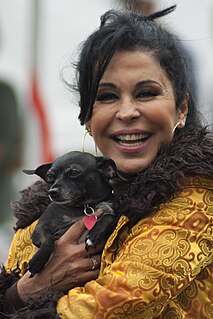 W
WMaría Concepción Alonso Bustillo, better known as María Conchita Alonso, is a Cuban-born Venezuelan singer, actress, philanthropist and former beauty queen.
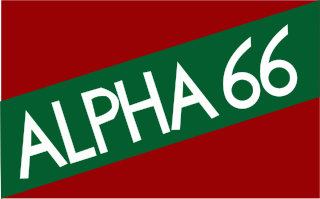 W
WAlpha 66 is an anti-Castro paramilitary organization that operates in the Southern United States. The group was originally formed by Cuban exiles in the early 1960s and was most active in the late 1970s and 1980s. Although its base of support has greatly eroded due to the end of the Cold War and the thawing of relations between the United States and Cuba, Alpha 66 is still active today and is recognized as a terrorist organization by state governments and research groups alike.
 W
WJose Jesus Basulto Leon is a former CIA-trained Cuban political dissident and the leader of the nonprofit Cuban exile organization Brothers to the Rescue.
 W
WDr. Óscar Elías Biscet González, is a Cuban physician and an advocate for human rights and democratic freedoms in Cuba. He is also the founder of the Lawton Foundation.
 W
WPedro Luis Boitel was a Cuban poet and dissident who opposed the governments of both Fulgencio Batista and Fidel Castro. In 1961, the regime sentenced him to 10 years in prison.
 W
WOrlando Bosch Ávila was a Cuban exile militant, who headed the Coordination of United Revolutionary Organizations (CORU), described by the United States Federal Bureau of Investigation as a terrorist organization. Born in Cuba, Bosch attended medical school at the University of Havana, where he befriended Fidel Castro. He worked as a doctor in Santa Clara Province in the 1950s, but moved to Miami in 1960 after he stopped supporting the Cuban Revolution.
 W
WPedro Pablo Cazañas y Garcia (1902-1978) was a prominent Cuban judge and politician.
 W
WThe Christian Democratic Party of Cuba is a Christian Democratic political party in Cuba. Although changes to the Cuban constitution in 1992 decriminalized the act of forming political parties other than the Communist Party, none of the parties are permitted to campaign or engage in any public political activities on the island.
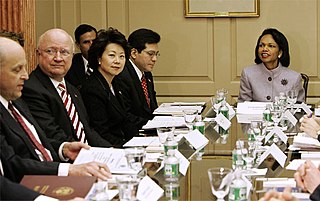 W
WThe United States Commission for Assistance to a Free Cuba (CAFC) was created by United States President George W. Bush on October 10, 2003 to, according to him, explore ways the U.S. can help hasten and ease a democratic transition in Cuba.
 W
WThe Cuban Democracy Act was a bill presented by U.S. Congressman Robert Torricelli and passed in 1992 during Cuba's Special Period of economic depression which prohibited foreign-based subsidiaries of U.S. companies from trading with Cuba, travel to Cuba by U.S. citizens, and family remittances to Cuba. The act was passed as "A bill to promote U. S intervention through the application of sanctions directed at the Castro government and support for the Cuban people." Congressman Torricelli stated that the act was intended to "wreak havoc on that island."
 W
WThe Democratic Social-Revolutionary Party of Cuba is a democratic socialist political party in Cuba. Although changes to the Cuban constitution in 1992 decriminalized the right to form political parties other than the Communist Party of Cuba, no parties are permitted to campaign or engage in public political activities on the island. Public engagements by party members are typically restricted to international gatherings of democratic socialist groups.
 W
WThe Democratic Solidarity Party was a political liberal party in Cuba. Although changes to the Cuban constitution in 1992 decriminalized the right to form political parties other than the Communist Party of Cuba, these parties are not permitted to campaign or engage in any public political activities on the island. The Democratic Solidarity party described itself as "an organization from within Cuba promoting democracy and the respect for human rights by the peaceful route." The last President of the party was Fernando Sánchez López. The party was a full member of Liberal International.
 W
WLincoln Rafael Díaz-Balart is a Cuban-American attorney and politician. He was the U.S. Representative for Florida's 21st congressional district from 1993 to 2011. He is a member of the Republican Party. He previously served in the Florida House of Representatives and the Florida Senate. He retired from Congress in 2011 and his younger brother, Mario Díaz-Balart, who had previously represented Florida's 25th congressional district, succeeded him. He is currently chairman of the Congressional Hispanic Leadership Institute. After leaving Congress, he started a law practice and a consulting firm, both based in Miami, Florida.
 W
WDirectorio Revolucionario Estudiantil was a Cuban student activist group which in opposition to Cuban dictator Fulgencio Batista from 1954 to 1957 played a role in the Cuban Revolution, which came to power in 1959. In 1960, the Directorio was relaunched in opposition to Fidel Castro and moved its base to the United States, where it soon developed links with the Central Intelligence Agency. In August 1962 it carried out an attack on a beachfront Havana hotel. As of 1963 it was the largest anti-Castro student group in Miami; it also had a chapter in New Orleans, where it had contact with Lee Harvey Oswald in mid-1963. Immediately after the 22 November 1963 assassination of John F. Kennedy, it launched a campaign asserting that Lee Harvey Oswald had been acting on behalf of the Cuban government. The group lost its CIA support in December 1966.
 W
WGloria Estefan is a Cuban singer, songwriter, actress, and businesswoman. A contralto, she started her career as the lead singer in the group Miami Latin Boys, which later became known as Miami Sound Machine. She earned worldwide success with "Conga" in 1985, this became Estefan's signature song and led to the Miami Sound Machine winning the grand prix in the 15th annual Tokyo Music Festival in 1986. In 1988, she and the band got their first number-one hit with the song "Anything for You". She is considered the Latin artist who broke down the barriers of Latin music in the international market and opened the doors to several latin artists such as Shakira, Jlo, Ricky Martin, Selena, among others.
 W
WGuillermo Fariñas Hernández is a Cuban doctor of psychology, independent journalist and political dissident in Cuba. He has conducted 23 hunger strikes over the years to protest various elements of the Cuban government and spent more than 11 years in prison. He vowed that he would die in the struggle against censorship in Cuba.
 W
WAlina Fernández Revuelta is a Cuban anti-communist activist. She is the daughter of Fidel Castro and Natalia Revuelta Clews. She is one of the best known Cuban critics of the government of Cuba and her father's and uncle's rule, where she lived until 1993.
 W
WCarlos Franqui was a Cuban writer, poet, journalist, art critic, and political activist. After the Fulgencio Batista coup in 1952, he became involved with the 26th of July Movement which was headed by Fidel Castro. Upon the success of the Cuban Revolution in 1959, he was placed in charge of the rebellion's newspaper Revolución, which became an official government publication. When he came to have political differences with the regime, he left Cuba with his family. In 1968 he broke with the Cuban government when he signed a letter condemning the Soviet invasion of Czechoslovakia. He became a vocal critic of the Castro government, writing frequently until his death on April 16, 2010.
 W
WEloy Gutiérrez Menoyo was a revolutionary who led the guerrilla force Second National Front of the Escambray Mountains during the Cuban Revolution against Fulgencio Batista and later opposed the government of Fidel Castro over its pro-Soviet leanings. His brother Carlos Gutíerrez Menoyo died in the Presidential Palace Attack of March 13, 1957.
 W
WOrlando Gutierrez-Boronat was born in Havana, Cuba in 1965. Gutierrez-Boronat is an author, spokesperson for the Cuban Democratic Directorate, member of the Assembly of the Cuban Resistance, invited lecturer at Georgetown University, and community leader.
 W
WThe Cuban Liberty and Democratic Solidarity (Libertad) Act of 1996, Pub.L. 104–114 (text) (pdf), 110 Stat. 785, 22 U.S.C. §§ 6021–6091) is a United States federal law which strengthens and continues the United States embargo against Cuba. The act extended the territorial application of the initial embargo to apply to foreign companies trading with Cuba, and penalized foreign companies allegedly "trafficking" in property formerly owned by U.S. citizens but confiscated by Cuba after the Cuban revolution. The act also covers property formerly owned by Cubans who have since become U.S. citizens.
 W
WJMWAVE or JM/WAVE or JM WAVE was the codename for a major secret United States covert operations and intelligence gathering station operated by the CIA from 1961 until 1968. It was headquartered in Building 25 at the former Richmond Naval Air Station, an airship base about 12 miles south of the main campus of the University of Miami in Miami, Florida. The intelligence facility was also referred to as the CIA's "Miami Station" or "Wave Station".
 W
WLadies in White is an opposition movement in Cuba founded in 2003 by wives and other female relatives of jailed dissidents and those who have been made to disappear by the Government. The women protest the imprisonments by attending Mass each Sunday wearing white dresses and then silently walking through the streets dressed in white clothing. The color white is chosen to symbolize peace.
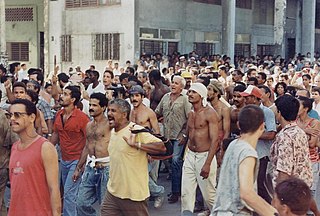 W
WThe August 1994 uprising or the Maleconazo uprising was a protest against government policies in Cuba. It occurred on August 5, 1994, on the Malecón, Havana.
 W
WEugenio Rolando Martínez Careaga was a member of the anti-Castro movement in the early 1960s, and later was one of the five men recruited by G. Gordon Liddy and E. Howard Hunt in 1972 for the Memorial Day weekend Watergate burglary at the Democratic National Committee (DNC) headquarters in Washington, D.C. He later worked as a real estate agent.
 W
WRaúl L. Martínez is a former mayor of Hialeah, Florida, United States. He is a Democrat and was mayor for 24 years, first elected in 1981 and was the Democratic congressional candidate for Florida's 21st congressional district in 2008.
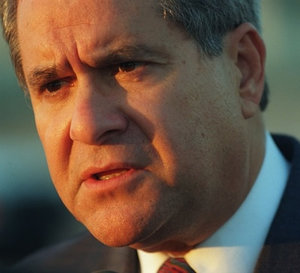 W
WJorge Mas Canosa was a Cuban-American exile who founded the Cuban American National Foundation and MasTec, a publicly traded company. Regarded within the United States as a powerful lobbyist on Cuban and anti-Castro political positions, he was labeled a "counterrevolutionary" by the Cuban Communist Party. Mas Canosa was the driving force behind the creation of both Radio Marti and TV Marti and was appointed chairman of the advisory panel by President Ronald Reagan. In the early 1960s, he was trained by the CIA for the Bay of Pigs Invasion and was commissioned as a second lieutenant in the United States Army. Under his leadership, the CANF received criticism for its role in covert operations in Cuba. In 1998, the New York Times published several articles on his relationship with Luis Posada Carriles.
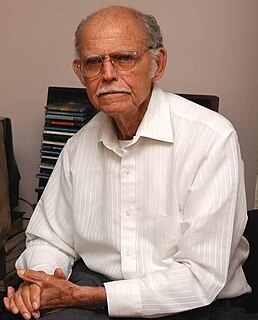 W
WHuber Matos Benítez was a Cuban military leader, political dissident, activist and writer. He opposed the dictatorship of Fulgencio Batista from its inception in 1952 and fought alongside Fidel Castro, Raul Castro, Che Guevara, Camilo Cienfuegos and other members of the 26th of July Movement to overthrow it. Following the success of the Cuban Revolution that brought Fidel Castro to power, he criticized the regime's shift in favor of Marxist principles and ties to the Popular Socialist Party (PSP). Convicted of treason and sedition by the revolutionary government, he spent 20 years in prison (1959–1979) before being released in 1979. He then divided his time between Miami, Florida, and Costa Rica while continuing to protest the policies of the Cuban government.
 W
WCarlos Saúl Menem Akil was an Argentine lawyer and politician who served as the President of Argentina from 1989 to 1999. Ideologically, he identified as a Peronist and supported economically liberal policies. He led Argentina as president during the 1990s and implemented a free market liberalization program to establish a country chronically plagued by political and economic crises. He served as President of the Justicialist Party for thirteen years, and his political approach became known as Federal Peronism.
 W
WWilliam Alexander Morgan was a United States citizen who fought in the Cuban Revolution, leading a band of rebels that drove the Cuban army from key positions in the central mountains as part of Second National Front of Escambray, thereby helping to pave the way for Fidel Castro's forces to secure victory. Morgan was one of about two dozen U.S. citizens to fight in the revolution and one of only three foreign nationals to hold the rank of comandante in the rebel forces. In the years after the revolution, Morgan became disenchanted with Castro's turn to communism and he became one of the leaders of the CIA-supplied Escambray rebellion. In 1961, he was arrested by the Cuban government and, after a military trial, executed by firing squad in the presence of Fidel and Raul Castro.
 W
WThe Cuban Project, also known as Operation Mongoose, was an extensive campaign of terrorist attacks against civilians, and covert operations, carried out by the U.S. Central Intelligence Agency in Cuba. It was officially authorized on November 30, 1961 by American President Kennedy. The name Operation Mongoose had been agreed at a prior White House meeting on November 4, 1961. The operation was run out of JM/WAVE, a major secret United States covert operations and intelligence gathering station established a year earlier in Miami, Florida, and led by United States Air Force General Edward Lansdale on the military side and William King Harvey at the CIA and went into effect after the failed Bay of Pigs Invasion.
 W
WOperation Northwoods was a proposed false flag operation against American citizens that originated within the U.S. Department of Defense (DoD) and the Joint Chiefs of Staff (JCS) of the United States government in 1962. The proposals called for the Central Intelligence Agency (CIA) or other U.S. government operatives to both stage and actually commit acts of terrorism against American military and civilian targets, blaming them on the Cuban government, and using it to justify a war against Cuba. The possibilities detailed in the document included the possible assassination of Cuban immigrants, sinking boats of Cuban refugees on the high seas, hijacking planes to be shot down or given the appearance of being shot down, blowing up a U.S. ship, and orchestrating violent terrorism in U.S. cities. The proposals were rejected by President John F. Kennedy.
 W
WOswaldo Payá Sardiñas was a Cuban political activist. A Roman Catholic, he founded the Christian Liberation Movement in 1987 to oppose the one-party rule of the Cuban Communist Party. He attracted international attention for organizing a petition drive known as the Varela Project, in which 25,000 signatories petitioned the Cuban government to guarantee freedom of speech and freedom of assembly as well as to institute a multi-party democracy. In recognition of his work, he received the European Parliament's Sakharov Prize and People in Need's Homo Homini Award.
 W
WClaude Denson Pepper was an American politician of the Democratic Party, and a spokesman for left-liberalism and the elderly. He represented Florida in the United States Senate from 1936 to 1951 and the Miami area in the United States House of Representatives from 1963 until 1989.
 W
WJesús A. Permuy is a Cuban-American architect, urban planner, human rights activist, art collector, and businessman. He is known for an extensive career of community projects and initiatives in Florida, Washington, D.C., and Latin America.
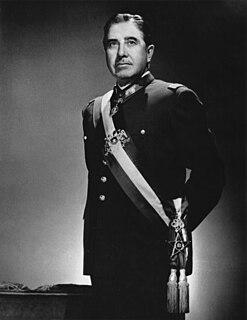 W
WAugusto José Ramón Pinochet Ugarte was a Chilean Army General who ruled Chile from 1973 to 1990, first as the leader of the Military Junta of Chile from 1973 to 1981, being self-declared President of the Republic by the junta in 1974 and becoming the de facto dictator of Chile, and after from 1981 to 1990 as de jure President after a new Constitution, which confirmed him in the office, was approved by a referendum in 1980.
 W
WHenry Pollack is the Cuban born American host and founder of "Havana Rock," a radio program that has been on the air since May 1995, the Miami, Florida show on radio station WWFE 670 AM and has enjoyed a cult following since it first aired in 1995. The show has received much praise for its staunch anti-Communist stance and has been featured on CNN, BBC, ABC and Fox News. It is also the only radio show in South Florida that is completely bilingual. He is also the editor of an anti-Fidel Castro web sites on the net, which went online in 1998 as one of the first anti-Castro websites on the internet.
 W
WAna María Cristina Polo González is a Cuban-American Hispanic television arbitrator on Caso Cerrado and Ana Polo Rules
 W
WPorno para Ricardo is a Cuban rock band founded in 1998. It is considered to be one of the most visible examples of young Cubans disagreement with the Castro's rule.
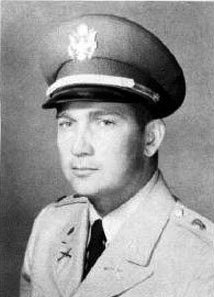 W
WLuis Clemente Posada Carriles was a Cuban exile militant and Central Intelligence Agency (CIA) agent. He was considered a terrorist by the United States' Federal Bureau of Investigation (FBI) and the Government of Cuba, among others.
 W
WAn attack on the presidential palace in Havana took place at around 3:30 PM on March 13, 1957. Perpetrated by the student opposition group Directorio Revolucionario Estudiantil, it had the objective of killing Fulgencio Batista, but was unsuccessful. According to one of the group's founding members, Faure Chomón, they were following the golpe arriba strategy and together with Menelao Mora Morales sought to overthrow the government by killing Batista.
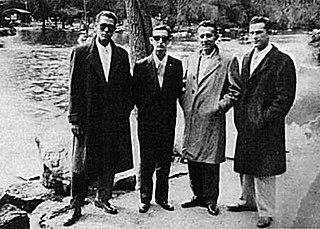 W
WThe Humboldt 7 massacre occurred on April 20, 1957 at apartment 201 when the National Police led by Lt. Colonel Esteban Ventura Novo assassinated four participants who had survived the Assault on the Presidential Palace and in the seizure of the Radio Reloj station at the Radiocentro CMQ Building.
 W
WRadio Televisión Martí is an American state-run radio and television international broadcaster based in Miami, Florida, financed by the federal government of the United States through the U.S. Agency for Global Media, which transmits news in Spanish to Cuba. Its broadcasts can also be heard and viewed worldwide through their website and on shortwave radio frequencies.
 W
WRaúl Rivero Castañeda is a Cuban poet, journalist, and dissident. Rivero was born in 1945 in Morón, Camagüey, in central Cuba.
 W
WMarta Beatriz Roque Cabello is a Cuban political dissident. She is an economist by training, and the founder as well as director of the Cuban Institute of Independent Economists. Agence France-Presse described her in 2007 as Cuba's "leading woman dissident".
 W
WMaría Elvira Salazar is an American journalist, author, and politician serving as the U.S. Representative for Florida's 27th congressional district. She is currently one of the Republican assistant whips under Steve Scalise. Prior to entering politics, she worked for the Spanish-language network Telemundo for three decades after serving as a news anchor for Miami-based Mega TV. She has also worked for CNN Español and Univision.
 W
WYoani María Sánchez Cordero is a Cuban blogger who has achieved international fame and multiple international awards for her critical portrayal of life in Cuba under its current government.
 W
WAlfredo Stroessner Matiauda was a Paraguayan army officer and politician who served as President of Paraguay from 15 August 1954 to 3 February 1989.
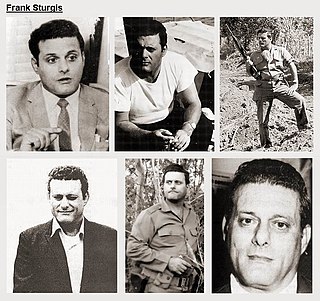 W
WFrank Anthony Sturgis, born Frank Angelo Fiorini, was one of the five Watergate burglars whose capture led to the end of the presidency of Richard Nixon. He served in several branches of the United States military and in the Cuban Revolution of 1958, and worked as an undercover operative for the Central Intelligence Agency. Sturgis and Miami CIA head David Morales met with E. Howard Hunt shortly before the assassination of John F. Kennedy.
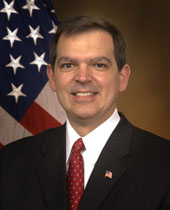 W
WMauricio J. Tamargo was the 14th Chairman of the Foreign Claims Settlement Commission. He was nominated by President George W. Bush in July 2001. He left the Justice Department in February 2010.
 W
WMaría Dolores "Mary" Tarrero-Serrano de Prio was the First Lady of Cuba from 1948 to 1952. She was the second wife of Cuban President, Carlos Prio, who was overthrown by Fulgencio Batista in a military coup.
 W
WThe United States embargo against Cuba prevents American businesses, and businesses organized under US law or majority-owned by citizens of the United States, from conducting trade with Cuban interests. It is the most enduring trade embargo in modern history. The US first imposed an embargo on the sale of arms to Cuba on March 14, 1958, during the Fulgencio Batista regime. Again on October 19, 1960, almost two years after the Cuban Revolution had led to the deposition of the Batista regime, the US placed an embargo on exports to Cuba except for food and medicine after Cuba nationalized the US-owned Cuban oil refineries without compensation. On February 7, 1962, the embargo was extended to include almost all exports. The United Nations General Assembly has passed a resolution every year since 1992 demanding the end of the US economic blockade on Cuba, with the US and Israel being the only nations to consistently vote against the resolutions.
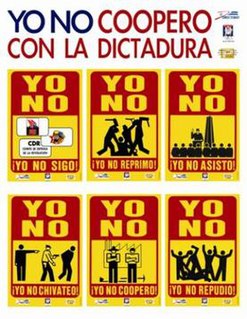 W
WYo No Coopero Con La Dictadura is a civil disobedience campaign by Cuban democracy activists.